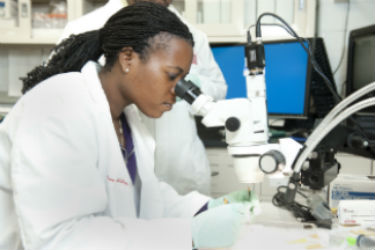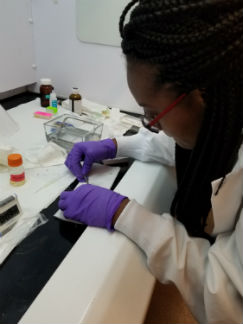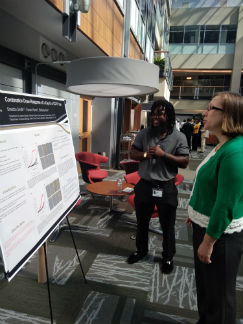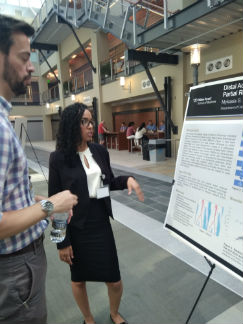The Biomedical Research Center (BRIC) at WSSU was established in 1996 through funding from the National Center for Minority Health and Health Disparities (NCMHD), National Institutes of Health (NIH).
As a result of this funding mechanism, WSSU is considered one of the original Research Infrastructure in Minority Institutions (RIMI) that was awarded the RIMI grant for the 2nd consecutive cycle. The initial funding was granted by National Center for Research Resources (NCRR)-NIH and under the Directorship of Dr. Wilveria Bass Atkinson, was used to build the biomedical research infrastructure at WSSU.
The mission of BRIC is to sustainably strengthen institutional biomedical research capacity at WSSU and to increase overall research productivity, with a focus on research areas that address health needs across a wide range of communities. Consistent with the objectives of the RIMI Grant and NCMHD initiatives, BRIC provides research infrastructure to emerging and established scientists at institutions serving regional populations, supporting the development of scientifically rigorous and context-appropriate medical innovations in settings where differences in health outcomes remain.
The purpose guiding BRIC's activities is to become a regional or national research resource for eliminating health disparities by creating a critical mass of well trained research scientists engaged in biomedical and behavioral research at the University, and increasing the quality and quantity of funded health disparities research projects conducted at WSSU. BRIC will leverage its strong interdisciplinary research capacity, community ties, relationships with established research institutions, and collaborative relationships with emerging research institutions to accomplish its purpose.
The broad and long term goal of the WSSU BRIC is to foster collaborative, multidisciplinary research and apply novel research strategies to improve health outcomes and reduce of health disparities among vulnerable for all communities.
To achieve the mission of BRIC, the BRIC team seeks to:

- Provide infrastructure and capacity-building activities that are consistent with the long-term institutional objectives of WSSU
- Increase the number of WSSU faculty who engage in biomedical and behavioral research
- Increase the number of WSSU faculty who receive extramural funding for biomedical research
- Increase research productivity of WSSU researchers in biomedical and behavioral research
- Provide intensive student development programs provide research opportunities with productive teacher-scholars who are interested in and committed to mentoring promising students in research.
- Increase the number of WSSU students who are well-prepared academically and experienced in research to be competitive to gain admission into top graduate programs leading to the Ph.D. or M.D. / Ph.D. in biomedical and behavioral sciences.
- Foster a long term commitment in students to pursue a career in the biomedical and behavioral sciences through an experience that exemplifies the excitement and challenges of relevant scientific investigation.
The Biomedical Research Center (BRIC) at WSSU was established in 1996 through funding from the National Center for Minority Health and Health Disparities (NCMHD), National Institutes of Health (NIH).
As a result of this funding mechanism, WSSU is considered one of the original Research Infrastructure in Minority Institutions (RIMI) that was awarded the RIMI grant for the 2nd consecutive cycle. The initial funding was granted by National Center for Research Resources (NCRR)-NIH and under the Directorship of Dr. Wilveria Bass Atkinson, was used to build the biomedical research infrastructure at WSSU.
Since its inception, BRIC has sought to facilitate and expand biomedical research at WSSU by strengthening the research infrastructure of the institution and providing an environment conducive to the discovery and dissemination of knowledge, and the professional growth of its faculty.
Under the current director, Dr. Jill Kieth, the core faculty is comprised of 11 Ph.D. researchers with approximately 4 staff members working in various capacities. The center has developed professional relationships with more than 6 other faculty Affiliated Scientists from Wake Forest University School of Medicine. A BRIC/RIMI Advisory Board and an External Scientific Review Board was established in 1996 to serve as the guiding force for the Center.
The BRIC will continue to have a positive impact on the number of faculty and students participating in biomedical research, and serve as a major point of entry for upciming scientists for participation in the biomedical advances of the nation in the 21st century and beyond.
Specific Goals are:
Goal 1: To strengthen existing institutional research infrastructure by supporting faculty as they conduct original and innovative biomedical and biobehavioral research aimed at improving health, eliminating health disparities, and translating scientific discoveries to benefit human health, especially global health diseases/disorders.
These will be accomplished through the recruitment of a critical mass of investigators and technical personnel.


 For over a decade, the Biomedical Research Infrastructure Center (BRIC) has been conducting and strengthening biomedical research capacity at Winston-Salem State University. Supported since 1996 by a grant from The Research Infrastructure in Minority Institutions Program (RIMI) of the National Institutes of Health, BRIC enhances WSSU's biomedical research infrastructure by:
For over a decade, the Biomedical Research Infrastructure Center (BRIC) has been conducting and strengthening biomedical research capacity at Winston-Salem State University. Supported since 1996 by a grant from The Research Infrastructure in Minority Institutions Program (RIMI) of the National Institutes of Health, BRIC enhances WSSU's biomedical research infrastructure by:
- providing a strong research-training environment to serve the needs of faculty and students at WSSU
- conducting original and innovative basic laboratory, behavioral, clinical, and population-based research aimed at eliminating health disparities
- leveraging WSSU's long-standing community partnerships to translate health services research outcomes into improvements for Winston-Salem's sizeable population and others throughout the state of North Carolina.
- creating opportunities for junior faculty to pursue research interests in general health or health disparities by supporting feasibility research projects
- supporting faculty development activities such as workshops, seminars and institutional research awards
- developing individual faculty expertise and credibility
- conducting independent research that is positioned to receive independent R01 funding support.
